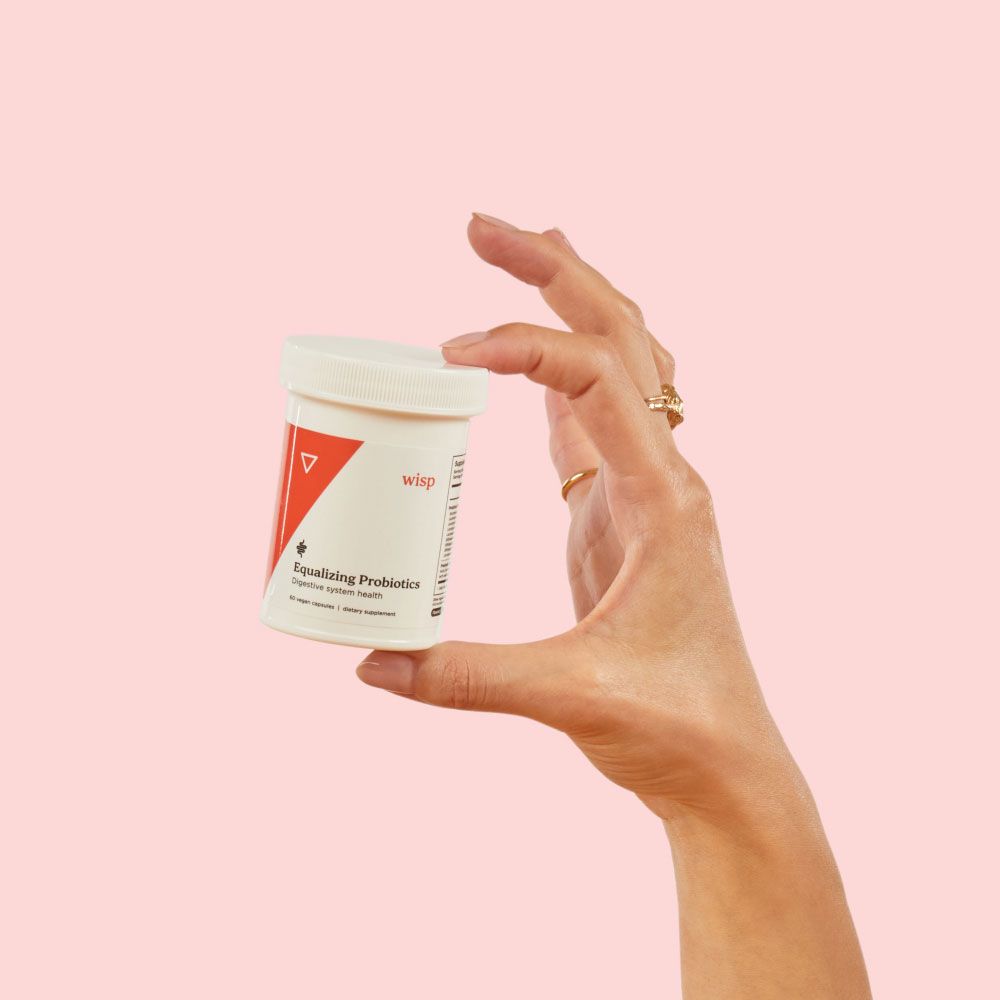
Down There Care
By Symone Elena
November 4, 2021
wis·per·ing /ˈ(h)wispər-ing: verb to turn up the volume of our reproductive & sexual health conversations
Why no "h"? We're changing the conversation around sex, our bodies and reproductive health.
Welcome to The Wispering Podcast where our goal is to change the volume on some of life's most difficult conversations. This podcast is brought to you by Wisp, an online telehealth community for women and men looking for reliable and discreet online care for their sexual and reproductive health needs. Log on to hellowisp.com and get same day, prescriptions for UTI, yeast infections, bacterial vaginosis, oral herpes (AKA, cold sores) and much more. Medication can be picked up at a local pharmacy or you can have meds shipped in discreet packaging directly to your home. Online consultations only take a few minutes and all medication is prescribed by US licensed providers for all fifty states.
What is up, you guys? Again, welcome back, Wispering Podcast, my name again, Symone Elena, I'll be your host. So we are at Episode 8, and I want to talk about extra care down there. I think a lot of those home remedies that you guys might see on Pinterest or social media, TikTok, whatever the case may be. They have good intentions, but there are definitely some warning signs and knowing the warning signs is just half the battle. I feel like seeing a gynecologist is something that I'm always first and foremost gonna recommend. I know the the thought of having to go to the doctor's office and go through that whole process is just very daunting and you just want to be able to take care of things on your own, or go into the store and just grab what you need. Like, I totally understand it, but that's just half the battle of just knowing warning signs and thinking you know how to cure it. And I know I talked about in the last episode of just knowing your body more than anybody else, but at the same time you have to know when you need to reach out for help and although a lot of, like, gynecological problems are asymptomatic, there are just many common symptoms that you can just be on the outlook for and I really need you to pay attention to those things. And again, it always boils down to any itchiness, bleeding between periods, redness, just burning when you're peeing, pain, discharge, all those things that are just so important and they do not need to be ignored. But these are also like, super reliable indicators that something is just not working as it should down there. And keeping track of any like, natural patterns of your discharge will help give you a better indication of what, you know, hormonal changes and events are happening in your body at any given point. So even if you wanted to, you know, keep notes in your note app, or if you still like to use pen and paper, keeping a log of that is super important and understanding your patterns can just help you to know when something is off. And unusual changes in your discharge — you know, the odor, the texture, or just amount, may be a sign that something is off and you just need to go get it checked out. So when there is like, a progression of an infection, there are some dangers behind that if you're allowing it to continue on without any actual care to stop it.
So, if you're experiencing any of the- like any of the above symptoms, I don't care if it's just one or all of them, and you decide to forego treatment because you're just too busy with work, or you don't get time, or it's not that serious, or you don't want to spend a morning in a doctor's office, and you might even find it embarrassing — these things need to be discussed with your doctor. You, like you, really got to think twice about that, so, for example, a common UTI infection — boom. If after a day or two you're not finding any relief with the usual remedies, like people recommend cranberry juice or, like a sitz bath, which is basically like an epsom salt bath, or just drinking plenty of water to kind of help flush out the infection, that's when you've got to turn to the professionals. Like, there's just some things you cannot fix on your own and it's okay.
So like, according to the National Institute of Health, bladder infections are actually like, the second most common type of infection in the body, and they are the reason for nearly 8 million doctor visits each year, like do ya'll, you get what I'm saying? Like how serious your sexual health is, and then, due to the bladder anatomy like how it's set up in your body, people with vaginas are much more prone to bladder infections than those with penises. Ah, to identify as a woman, must be nice. And if you've ever had a UTI, you know these infections are just really uncomfortable and highly disruptive to your everyday life. To the point where you just like, you know, I don't even want to go to the bathroom, or I don't want to move, or I don't want to go anywhere because the pain is just so much. You definitely need to call your physician if you're experiencing any of the following: blood in the urine, any burning pain, when you do urinate urinating more frequently, and then, also that intense urge, because UTIs will make you feel like you need to pee and then, when you go, you can't. And especially like, blood in the urine, there could be a blood clot, like there's all these different variables that you don't want to ignore just because you think you can fix it on your own. and you don't have to do it alone, and timing is so important like it really is of the essence, if you're suffering from a bladder infection, because it can quickly progress to the kidneys and from there, ya'll, it's a domino effect. When bacteria attacks the kidneys, they can cause damage that will permanently reduce kidney function. So, in people who already have kidney problems, the, the risk, you're just raising the risk at this point of just full on kidney failure, like you see where I'm going with this? So there's just also a small chance that the infection may enter into the bloodstream and spread to other organs, and you see how they started out, as- I'm not going to put I'm going to put air quotes around "simple,"- but a very common, just regular UTI, but because you allowed it to progress further than where it was, it can really affect your body and cause health issues that could also lead to death. And I'm not trying to like, freak you out or anything, but everything there's, a solution to many things out there, whether you believe it or not, and it's not always on the Internet like, it's not.
So, I know that like PID, which is the Pelvic Inflammatory Disease, it's like a really common complication of untreated STIs, and it occurs when bacteria from an STI spreads from the vaginal canal to the uterus, Fallopian tubes, ovaries, and once you've experienced PID once you are more likely to get it again. And it's just possible to be asymptomatic for this infection or to only experience like super mild symptoms, so it can be easy to miss and you just probably not really paying attention to it. But if you do experience these symptoms, they may include pain in the lower abdomen, a fever, you know. unusual discharge, some pain or even bleeding when you do have sex, and a burning sensation when you urinate. So bleeding between periods is also something that you should also look out for when it comes to PID. If you have any of these symptoms, guys, or any STI symptoms, again, I don't know how many times I could say this. It's super important to go see your doctor right away because these infections can cause like super internal scarring that can cause long term pain and infertility. And unfortunately, 1 in 8 women with a history of PID have trouble getting pregnant. If that's something important to you, again, your sexual health is so important to your reproductive health. They're usually- you can, you can have one without the other, but they're both going to affect each other.
So I know cervical cancer is something that's talked about a lot to young girls and for me, when, when I experienced like that, that first STI situation when I was in high school or whatever, because I had prolonged it, I ended up getting cancer cells. Thankfully, you know, they were benign and I was able to work past that, but I think Gardasil might have been, or still is- hopefully, hopefully that's the right name, but yeah. Gardasil was like that, like, lack of a better term, vaccine that they wanted, you know, girls to take and women to take to help get rid of or help battle against getting cervical cancer from you know, HPV. And I really want to make sure you guys are getting screenings for that too, but bleeding during sex and other cervical cancer symptoms should just be investigated immediately. That's no joke, it's not funny. It's literally a disease that more than 13,000 women in the US are diagnosed with every year, and it is the fourth most common type of cancer for women worldwide because it develops over time. And it's also one of those preventable types of cancers too. So that's what kind of breaks my heart at the same time as that, because it's something that was preventable, but it was ignored. And I will say the good news is that deaths from cervical cancer in the US continue to decline by like approximately 2% a year, and this decline is primarily due to the widespread use of the PAP test. You know, when we go get our Pap smear. I know it used to be like you had to go every year to get it. I think now it's every three years that you go, so if you're almost at the three year mark, go ahead and make sure you got your appointment in place, but the Pap smear test helps detect any cervical anomalies and allow for early treatment, so it's so important to keep up with those consistently. For me, I like to go ahead and plan three years in advance for my appointment. I know which is crazy, but at least I know that appointment is already secured and then once that time comes back around again, if life has changed for me, I just reschedule the appointment, but at least I know I did my part to at least schedule it and make sure that it's in my books already. Most women who have abnormal cervical call changes that progress to cervical cancer, have never had a Paps test or have not had one in the previous, you know, three to five years and it's very scary to know that, you know, some women don't have the access to getting a Pap smear test and when they're left with cervical cancer, it's something that was preventable. But unfortunately, healthcare is just not super accessible to everyone, so that's why I wanted to make sure that you all had an episode dedicated to getting tests done and just doing some local searches around getting a Pap smear test, even if you can't afford it. I still think there are some of those free clinics out there that will literally just be open on a Thursday and will take anybody, whether you have, you know, insurance or not, But with the Pap smear test, it can find those cell changes to the cervix caused by HPV, Human Papilloma Virus, and HPV test, find the virus, and they basically help the health care provider know which women are at the highest risk for the cervical cancer. So if you did not know that, that's why it's so important. Pap and HPV test, either alone, you know, or in conjunction with each other, each other are recommended for women over 30. So, ladies, if you're getting to that mark, your thirties are lit, but you just got to be more aware of the changes in your body and definitely keep up with your health. Of course, each woman should ask her healthcare provider how often she should be screened and which tests are right for her, but for the most part definitely get those Pap smears done
Now for those recurring infections that we talked about in the last episode, Bacterial Vaginosis, AKA BV. It affects the mix of bacteria in the vagina, and this is just another quick run down of it. I know we talked about it before, but it occurs when the balance of healthy bacteria in the vagina is a little upset and it's being upset by harmful bacteria. So it's just really good fighting the bad, and it's lowkey losing the fight, such and. Normally like, the harmful bacteria that I'm familiar with is Gardnerella vaginalis and it's honestly one of the most common infections, so if you definitely want to look it up and do a little bit more research on it just so you can know what to look out for. I definitely would, but if you are experiencing those recurrent infections, try switching up some stuff in your lifestyle. Like, some of those lifestyle habits that you have, if you switch them up, you'd be amazed by the solutions that you would find. Like, I know for some people when they drink, they always get acne, or they'll get a, you know, a pimple here and there, but then when they stop drinking, it goes away. So sometimes it requires long term, lifestyle habits, you know, to get the solution, and then sometimes it's super temporary and your body just had, you know, a little reaction to something that you tried out and it just didn't like it. These are just always things to look out for like indications of what your body likes and what it doesn't like and what it's wanting you to change. Now, although the exact cause of BV isn't clear, some experts do believe that sex is just a contributing factor, and I will agree with that too. Again, we were talking about, you know, unprotected sex and does even having sex with a new partner or multiple partners, they just may alter, you know, the bacteria in the vagina, so you just have to be super, super mindful. Like I get, "Oh well, we both took a shower, so we should be clean." Yes, you should do that. Highly recommend. But that isn't the only- like, hygiene isn't the only way to protect yourself. It is very important, but you have to, again, be mindful of different partners that you're taking on, making sure you're both clean and when I say clean, meaning you both got tested, things came back negative. Now there are other practices such as douching, like we talked about before, which will increase your- increase your risk of BV. Now make a judgement call about what things are important to you and what things you could switch up and see if they just have a positive impact on your health. Like, I'm not trying to tell you how to live your life and what to do and what not to do, but I kind of am. Like I want you to be safe, and I want you to be able to take care of yourself, but certain things that we do, that we like may not be the best thing. Like it could be a good thing, but it's not the right thing and like douching, again y'all, people some- some folks just douche because they believe, you know, it makes them cleaner, and I get that philosophy, but it's just not right. Like in reality, your vagina cleans itself, even when you have an infection. It's literally fighting against what is going on and trying to save itself. But it's kind of like, all right look, I need some help, I need some back up, like I need you to tap in, get in the ring with me, and let me show you what's going on, and where I'm losing it so that you can help win that battle. And again, douching can disrupt the natural balance of vaginal bacteria and increase the chance of an infection. So just don't do it, like please just- just don't do it.
Now, something that could possibly help: Boric Acid. Now, I'm not talking about like, the Boric Acid that, that you would like use for like pest control, but there are Boric Acid tablets that can be used as more of like a preventative treatment for BV, and even with Yeast Infections, I will say, there is a brand, I think called Love Wellness, I mean their packaging is hell cute, so they'll definitely get you there, but they're super- outside of Wisp, I'm just giving some other options, but Love Wellness is definitely, they have this one called The Killer, like it's a Boric Acid suppository. I like to like, test out different things and different price ranges to like, give feedback on. So they're one brand, I think Honey Pot yeah I think Honey Pot has like a Boric Acid, I think herb one, that one's around $18 to my knowledge, and then there should be another one called like PhD Feminine. Most of these, you can find at Target, which is, which is really good, but CVS, different places like that, like some people who, if you like to shop online, I'm pretty sure you can get a delivered. But Wisp, hands down, if you guys need these type of things, like the suppositories, or- or the tablets, they have them. And I do know, like, there was an early study that a combination of like suppressive, antimicrobial therapy and intravaginal boric acid was used to treat recurring BV and like women who are age around 58 and up, and the study results actually showed varying levels of successful treatment which was defined as achieving remission. So the levels of success were categorized based on the makeup of the course of the treatment. So it was, it was a little bit different, but it is safe to saay that it can be used safely in the vagina and is an effective- it is as effective as some medical approaches to treatment so, as I wouldn't say, like a first resort, but if you're super like, if you really like, really really cannot go, see your doctor and you know for a fact what's going on, or you at least want to initially treat it with a Boric Acid tablet and nothing is working, then go see your doctor. But if the Boric Acid does help, I will still recommend to go see your doctor just to make sure that the infection is gone because it could have helped with the symptoms, but it might not have actually cured the infection. So, you know, there's more research that needs to be done to help better understand this treatment approach. However, Boric Acid is not edible, ya'll, so it is toxic to eat. Do not eat those tablets, they are suppositories, meaning they need to be inserted. There are instructions on the back, so please follow it, and it definitely needs to be kept away from children, animals. It's honestly, it's just not safe to use if you're pregnant- and I know some women who deal with these- these type of things like STIs and all that with their body and their hormones changing. So I totally do not recommend you taking these at all if you're pregnant, and you definitely need to take some extra precautions if you are pregnant and you're experiencing any discomfort or irritation.
Now a reminder: health concerns need to be taken care of quickly and effectively to prevent long term health impacts. I mean, shelling out a lot of money for like a course of antibiotics is, is just, it's not fun. Like, you could have been using that money for vacation, but if you're especially tight on a budget, I get it. But long term cost on your health and your finances can be astronomical, so you're choosing one of the lesser evils. Like there's two options you got here, they're both expensive, but one is going to cost you more down the line financially and health wise than the other is, so you're just going to have to, you know, bite the bullet on that. But thankfully, we live in the wonderful age of the Internet, or you can just book an inexpensive online consultation and have access to affordable medicines if you know where to look. And that's where Wisp comes in. So if you're not familiar with the website, hellowisp.com. Go there, that's the website. It offers the best in budget online healthcare ya'll, and if you are experiencing any gynecological issues, you can book a consultation with one of their Wisp doctors, and they also, you know, have super great breakdowns, other doctors so you're just at least getting a feel for who you're going to be speaking with, and yes, it's a complete stranger, but it's better to be able to see and get a little blurb about who you're talking to before you do. And they also offer super pocket friendly, like, FDA-approved medications to all fifty states, so it really doesn't matter where you live within the US, like you can definitely get the care, which is amazing. And there are no delivery charges. Like who else, outside of me, will definitely empty their shopping cart once that $5.99 shipping kicks in. Like to me, that's more expensive than what I'm actually buying, but overall y'all, preventative lifestyle changes can go a long way in reducing any instance of an infection. However, if your symptoms have not resolved or reduced after a week of home treatments, meaning, "I laid in a bath of apple cider vinegar and it's still...." Like, that is like the absolute last thing I want you to do. Like, I know you gonna do it because I know you on Pinterest, but those apple cider vinegar baths, and drinking apple cider vinegar, like, just- yes drinking it hereand there is, you know, it does, have some health benefits, but drinking it to cure something. You can- you can definitely burn your lining and your intestine with consuming way too much apple side of vinegar, or not doing the right amount, like just don't do it.
Make an appointment with the gynecologist, or go to urgent care just to nip all that in the bud. Like, and it'll truly help reduce your chances of any serious or expensive long term complications, like I promise you, once you figure out your plan, get the right course of help. You will have a better, a better instance and long term care when it comes to having these infections- and I know it's not fun, and it's not ideal about how you want to spend your days dealing with this. But the sooner and the quicker you handle it, the better the outcome is going to be. so I think that is definitely going to be it for today's episode. Again, reach out to hellowisp on IG or Twitter, @hellowisp (W-I-S-P). The same goes for their website, hellowisp.com. It's super easy I'm @SymoneElena if you feel like chatting or just, you know, stalking my 'gram. Yeah until next time guys, be love, be light, wrap it up once, never twice.
Shop Preventive Care

Boric Acid Suppositories
Starting at $27
An over-the-counter vaginal suppository custom-made to help prevent & relieve infections.

Wisp Equalizing Probiotics
Starting at $18/ month
The Wisp Equalizing Probiotics is a daily supplement that contains 25 billion CFU’s of 9 powerhouse probiotic strains (more “good” bacteria!).

Urinary Tract Duo
Starting at $90
Struggle with urinary health? You’re in the right place. We’ve captured the ultimate in urinary tract health power in one easy bundle.

At-Home Vaginal Microbiome Screen by Daye
$125
Understand your vaginal microbiome balance and risk of infections using a non-invasive at-home tampon collection kit.

